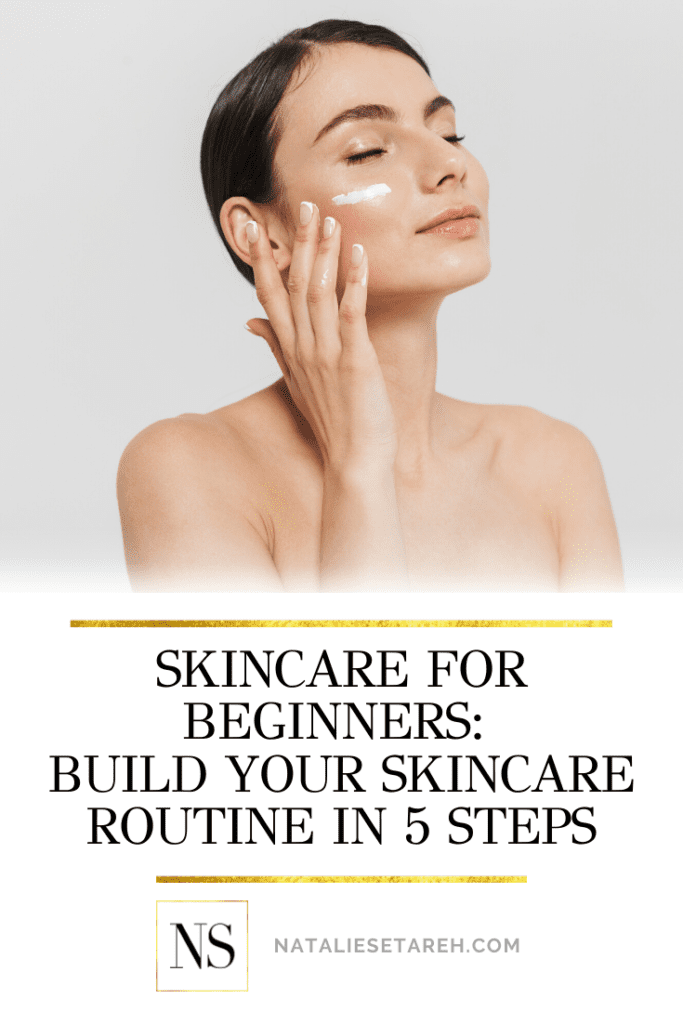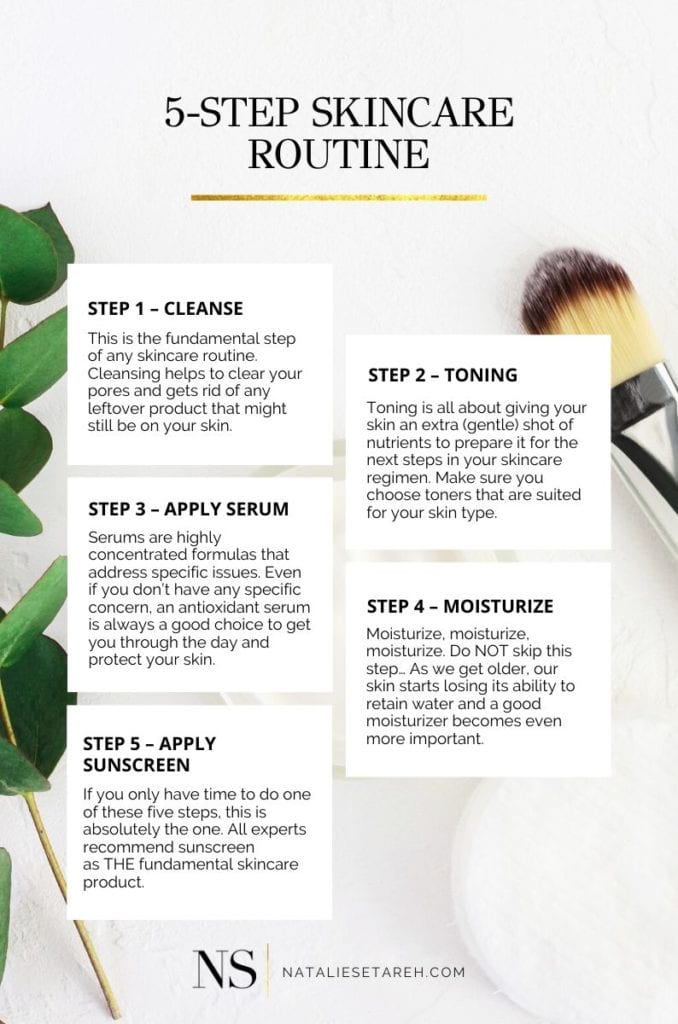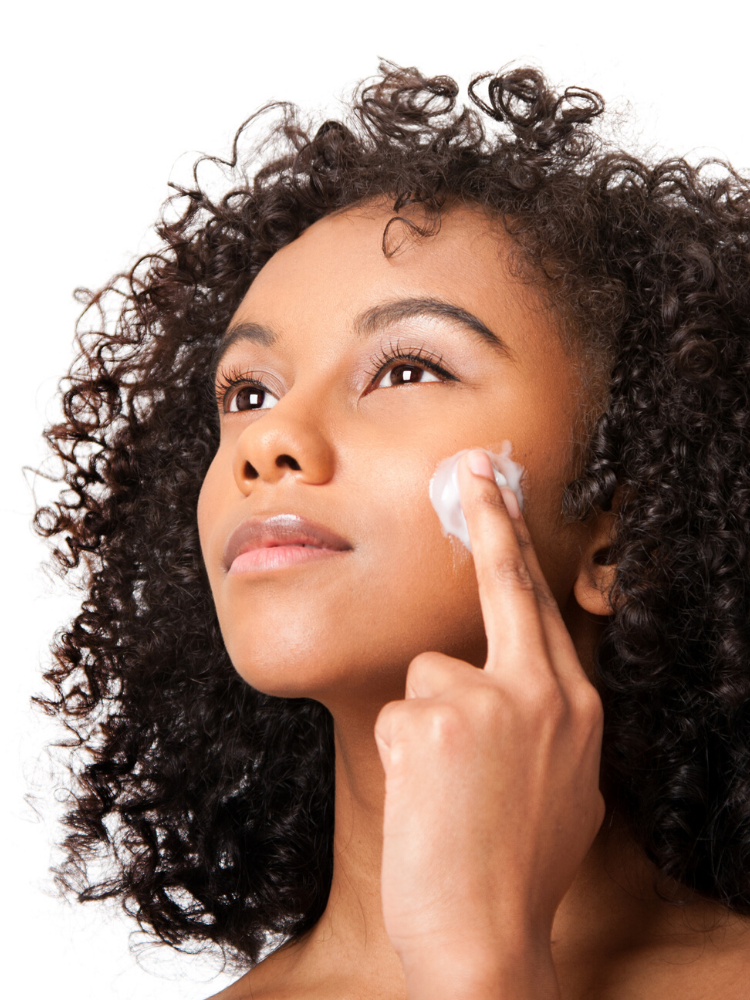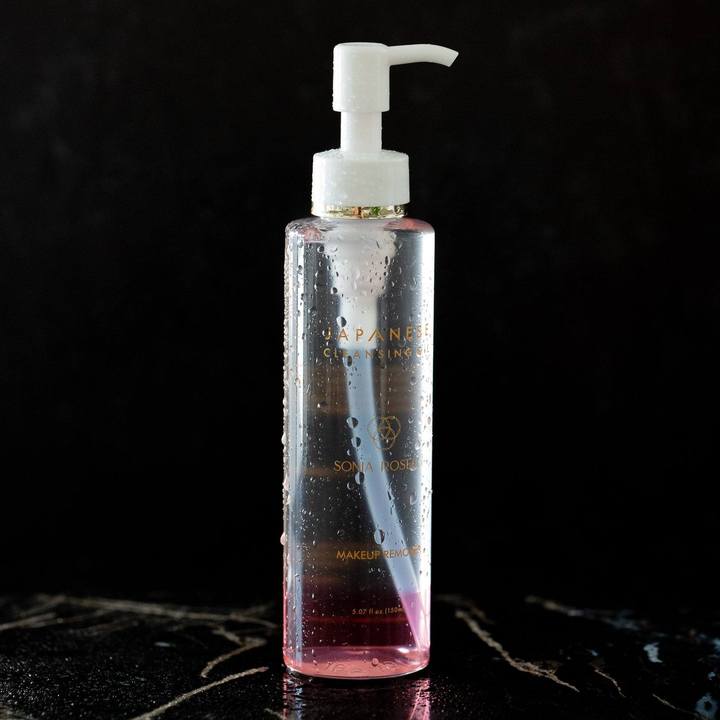
Building your own skincare routine is not an easy task when there are so many different products out there. It seems like every week there’s a new trend, a new brand and it can be easy to feel like you’re left out there completely alone, just trying to figure out what the heck of anti-aging cream is the best for your skin
That is why I created my easy to understand Skin Type Guide, which is perfect skincare information for beginners.
I know, I know… the wide range of cosmetics and brands might seem overwhelming at first. But, it’s just a matter of knowing what your specific skin type needs in order to look its absolute best. In reality, building your own skincare routine is not as hard as it might sound and I will show you why.
When you have a solid skin care regime, you won’t feel the need or urge to apply too much makeup. Makeup only enhances healthy skin — makeup shouldn’t cover it up. Please in mind, there is a difference between skin care and skin prep. Further reading on the differences can be found here: Skin Care x Skin Prep: What You Need to Do Today to Ensure Beautiful Skin for Life
Ground Zero: Identify Your Skin Type
First of all, you don’t need all those fancy last-generation creams. Sometimes, all your skin needs is a serum that you can find at the drugstore! We are all unique and our skin reacts differently to different substances, formulas, and even perfumes. Determining what your skin likes (and what it doesn’t) is the first step.
Skincare is self-care.
Before you do anything, before you start any skincare regimen, you should first be truly aware of who you are, what’s your body like and how it changes over time. And that, ladies, is self-care.
Like I said, our skin types are as different and unique as we are. You might get acne from applying a certain kind of serum and your bff might see amazing results! That’s why we have to take recommendations (especially from people on YouTube) with a grain of salt. What works for one person doesn’t necessarily work for another.
So, before we even get too deep in this skincare for beginners’ guide, you should first properly understand your skin type. You’ve probably known since you were a teenager whether you have oily skin, dry skin, acne, whatever. But keep in mind: our skin changes as we age. Our hormones are the ones to blame – most of the time – and as we go through life, they ride on a rollercoaster. PMS and pregnancy, for example, can take a pretty serious toll on your skin.
If you’re not sure what your skin type is, no worries. I created a free guide where you will learn everything about skin types and how to find out which one is yours – even during pregnancy. Once you’ve read the guide and identified your skin type, you can move on and keep on reading this post.

Save this image on your Pinterest to read this post whenever you want 🙂
Building a skincare routine doesn’t need to be complicated. In fact, there are only 5 steps you need to follow. But even before you get started on these five steps, I want you to think about your skincare goals. What are you trying to achieve with your skincare routine?
For example, if you have oily skin, your goal might be to manage that extra shine. If you have dry skin, you might want to keep it hydrated and get that coveted glow. Once you have a goal, you can start gathering products that will help you achieve it.
One last thing: skincare results don’t happen overnight. The more you take care of your skin, the better your skin will look and feel. Set aside a few minutes in the morning and in the evening to invest in your skincare game. It will pay off, trust me!
Step 1: Cleansing
This is the fundamental step of any skincare routine. Cleansing helps to clear your pores and gets rid of any leftover product that might still be on your skin. This is also a great way to manage oil and prevent pimples and blackheads.
Cleansing also prepares your skin to absorb other products that will come later in your skincare routine, like serums and creams. Don’t skip this step! You can do it once or twice a day – but that’s it! Don’t overdo it.
If you have oily skin, you should cleanse twice a day, in the morning and before bed. If you have any other skin type, once is probably enough. Cleansing too much can damage your skin and dry it out.
The Best Cleanser for Each Skin Type

Save this image on your Pinterest to consult it whenever you need 🙂
Oily or Acne-Prone Skin:
Foaming Liquid
Foaming liquid cleanser is super effective for oily or acne-prone skin. The airy texture of the foam helps to break down any dirt that’s stuck in your pores and eliminates the excess sebum from the skin. It’s designed to deeply cleanse your skin and make you feel refreshed. Check out this skincare routine for oily skin>
Dry, Red or Eczema-Prone Skin:
Cream or Oil Cleansers

Cream cleansers and lotions are usually made with glycerin or shea butter which are great to keep your skin feeling fresh and hydrated. Oil cleansers are a great option for dry skin, too. They do double-duty by both cleansing and attracting other oils present on your skin, dissolving them without drying you out.
Important to know! I have dry skin and share a lot about how I take care of it. Make sure to follow me on Instagram (especially the stories) you can also shop my dry skin routine >
Sensitive Skin:
Oil Cleansers
Oils are generally well tolerated by people with sensitive skin. Argan, avocado, coconut, and jojoba are some of the great oils to choose. Bioderma Sensibio also has amazing cleansers for sensitive skin. This line is highly tolerated even by people taking isotretinoin, who end up having really sensitive skin during the treatment.
Sonia Roselli has my favorite skincare line for sensitive skin >
Mature Skin:
Melting Balm
Melting balm is awesome. It has a butter-like texture, but when you rub it on your skin, it… well, melts. It feels like you are already on the third step of your skincare routine because you don’t even need to wash it off. Melting balms are great for mature skin.
Check out this post on Makeup For Mature Skin >
All Skin Types:
Micellar Water
Micellar water is a universal choice that works for all skin types. It contains molecules that break down dirt and oil without making your skin feel dry. The texture is light (after all, it’s basically water!). I like to use micellar water in my skin prep, after I cleanse and before I apply makeup.
Step 2: Toning 
If you are like me, you have some very vivid memories about using astringent toner as a teen. You know, the ones that are basically pure alcohol and can make even the oiliest skin crack? I can’t believe I used to think that was great for my skin!
Fast forward to the 21st century (yes I just dated myself): skincare has evolved and toner without alcohol is a must! Toner these days is all about giving your skin an extra (gentle) shot of nutrients to prepare it for the next steps in your skincare regime.
Make sure you choose toners that are suited for your skin type. Bonus points if you can find a product that contains hyaluronic acid, rose water, or vitamins E and C. If you have oily skin, you may want to check out this post on a skincare lineup from the Ordinary.
Step 3: Applying Serum 
Serums are highly concentrated formulas that address specific issues like fine lines, acne, dark spots, rosacea, etc. That’s why serums tend to be the most expensive products when building your skincare routine! Even if you don’t have these specific concerns, an antioxidant serum is always a good choice to get you through the day and protect your skin.
Vitamin C is a common daytime brightening serum that most people can use without issue. Retinol serums are common for people who want to stimulate collagen production to prevent wrinkles. Niacinamide serums, on the other hand, focus on treating inflammation and acne.
The best way to choose is to do some research on the topic you want to improve and talk to a dermatologist or esthetician. I know a lot of people like The Ordinary for serums because they’re very inexpensive. Just be sure to always remember to carefully read the product instructions before applying it to your skin.
Step 4: Moisturize 
Moisturize, moisturize, moisturize.
Do NOT skip this step… even if you have oily skin. Yes, even oily skin needs a good moisturizer. Why? Because moisturizers are not made to make your skin oily, they are made to keep your skin hydrated. Two different things. As we get older, our skin starts losing its ability to retain water and a good moisturizer becomes even more important.
Of course, there are ideal moisturizers for every skin type.
For oily skin, for example, a gel moisturizer is a good option because it’s light and water-based.
People with dry skin should go for creams that have more oil in their composition and people with normal skin can use lotions (a little more moisturizing than gel and less oily and thick than creams).
Last but not least, people with sensitive skin (but without acne) may opt for a balm that feels more soothing for sensitive skin.
Don’t forget to take my Skin Type Quiz if you don’t know your skin type!
Step 5: Use Sunscreen 
If you only have time to do one of these five steps, this is absolutely the one. All experts recommend sunscreen as THE fundamental skincare product.
Using sunscreen is the best way to prevent wrinkles, fine lines, and of course, skin cancer. It can even help to correct skin texture and reduce the appearance of pores.
Some people combine steps 4 and 5 and look for moisturizers that have a built-in SPF. I don’t love this, because I think it’s less effective. Just be aware, the minimum protection factor dermatologists recommend is 30.
Keep in mind, there are different kinds of sunscreen for different skin types. Check out this post on SPFs and how to find the right one for you.
So, have you built out your skincare routine? If not, now is the perfect time to learn the basics about skincare for beginners! Who’s in?!
Do you want to get inspired and find the best beauty and makeup tips for beginners and professional makeup artists? Take a look at my Pinterest account! There you’ll find the best content about makeup and makeup artist business.
Beauty is about perception, not about make-up. I think the beginning of all beauty is knowing and liking oneself. You can't put on make-up, or dress yourself, or do you hair with any sort of fun or joy if you're doing it from a position of correction.
kevyn aucoin


